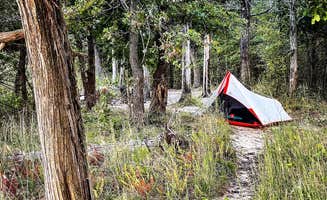Tent camping near Kingston, Oklahoma centers around Lake Texoma, a 89,000-acre reservoir with 580 miles of shoreline. The region experiences hot summers with temperatures regularly exceeding 90°F from June through September, while spring and fall offer milder conditions. The lake's water level fluctuates seasonally, affecting shoreline camping availability and access to primitive sites.
What to do
Fishing opportunities: Hickory Creek provides access to some of Lake Texoma's best fishing spots, particularly for catfish. According to one camper at Hickory Creek, "We used to go here to do some bank fishing and pulled some nice sized catfish."
Trail exploration: The Cross Timbers Texoma Hiking Trail offers primitive campsites accessible by hiking. The trail system provides opportunities for day hikes ranging from 2-5 miles with moderate terrain and elevation changes. Cross Timbers Texoma Hiking Trail Primitive Campsite is accessible only by foot, requiring campers to carry in all supplies.
Wildlife observation: The region supports diverse wildlife populations including deer, various bird species, and occasional wild hogs. Bring binoculars for spotting wildlife from a safe distance, especially in early morning hours.
What campers like
Night sky viewing: Areas with minimal development provide exceptional stargazing opportunities. At Hickory Creek, "The night skies here are vast on a clear night and you will hear a lot of animals moving around this area as there are large populations of deer and other smaller animals."
Secluded campsites: The primitive nature of many camping areas allows for privacy and quieter experiences away from developed campgrounds. Most dispersed sites require a short hike or boat access, limiting crowds even during peak seasons.
Access to water activities: Beyond fishing, Lake Texoma provides swimming, kayaking, and boating opportunities. Willow Springs offers "A nice rv hook up great family place" with convenient water access.
What you should know
Seasonal considerations: Water levels significantly impact camping conditions. According to one visitor, "This place can be a bit hit or miss depending on the season because of the water levels."
Wildlife precautions: Food storage is essential due to active wildlife. "Do not leave food out at your camp because of the amount of wild animals in the area or you will get overrun by morning," advises a Hickory Creek camper. Secure all food items in locked containers or vehicle storage when not in use.
Limited amenities: Most tent sites near Kingston require complete self-sufficiency. Pack in all water, waste disposal bags, and supplies as most areas have no trash service, water sources, or facilities. Cell service is typically limited or non-existent, particularly in more remote camping areas.
Tips for camping with families
Safety equipment: Pack appropriate safety gear for lake activities including life jackets for all family members. Willow Springs Resort is popular among families but requires bringing all safety equipment as rentals are not available.
Weather preparedness: Summer temperatures frequently reach 90-100°F with high humidity. Bring extra water, cooling towels, and portable fans to manage heat, particularly for tent camping with children. Shade structures are recommended as natural shade is limited at many sites.
Activity planning: Structure camping trips around early morning and evening activities to avoid midday heat. Pack board games, wildlife guides, and star charts for entertainment during downtime periods.
Tips from RVers
Access limitations: Many primitive camping areas near Kingston have narrow access roads unsuitable for larger RVs. Scout locations ahead of time or contact rangers for current road conditions.
Generator restrictions: Most primitive sites prohibit generator use. iGLAMP offers alternatives with tent and yurt options that provide more comfort than traditional tent camping while maintaining a natural experience.
Water access: No potable water is available at most primitive sites. Fill tanks completely before arrival and bring additional container capacity for extended stays. Calculate 1-2 gallons per person per day minimum, with additional water needed during summer months.



